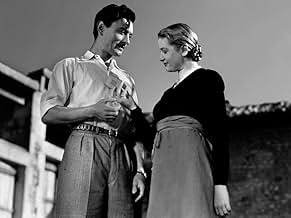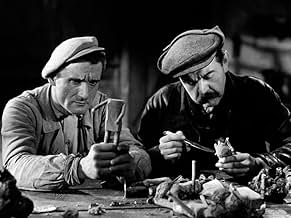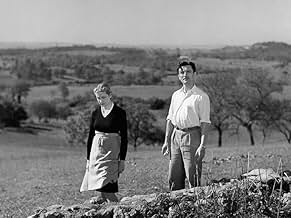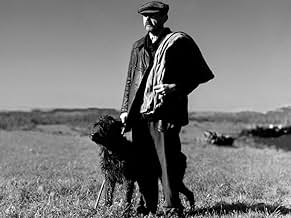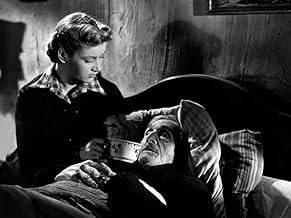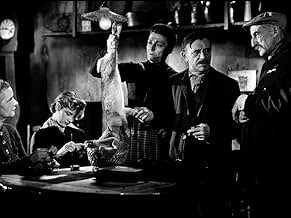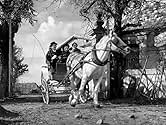CALIFICACIÓN DE IMDb
7.5/10
1.1 k
TU CALIFICACIÓN
Agrega una trama en tu idiomaIn a lost French village, an old woman is killed and her savings stolen. Several members of her family, all called "Goupi", are suspected.In a lost French village, an old woman is killed and her savings stolen. Several members of her family, all called "Goupi", are suspected.In a lost French village, an old woman is killed and her savings stolen. Several members of her family, all called "Goupi", are suspected.
- Dirección
- Guionistas
- Elenco
- Premios
- 1 premio ganado en total
Albert Rémy
- Jean des Goupi
- (as Rémy)
Georges-François Frontec
- Bit Part
- (sin créditos)
Maurice Marceau
- Un porteur à la gare
- (sin créditos)
- Dirección
- Guionistas
- Todo el elenco y el equipo
- Producción, taquilla y más en IMDbPro
Opiniones destacadas
This is actually a very subversive film, given the circumstances and the date (1943) at which it was made. It is set in the Charente, which is a region a little to the east of La Rochelle, and not too far from the cities of Limoges and Poitiers. As such it was close (if not on) the border between the zone of (German) occupation and Vichy France. Although this film consists mostly of interiors there are enough outdoor scenes (all shot in what looks like late autumn or early winter) to give a real feel for the countryside.
Vichy (which had a reduced jurisdiction over occupied France) sunk a very large amount of political capital into the promotion of a 'certain idea of France' - that's De Gaulle's phrase, however, not Petain's). That 'idea' was of a rejuvenated nation, that case aside the infamous corruption of the Third Republic, and which gave pride of place to morality, (Roman Catholic) religion and country - specifically the countryside, rather than the cities (which were nests of subversives and Semites, so-called). It was a form of the 'integral nationalism' promoted by Charles Maurras, but with Petain as a substitute monarch.
However, here is a film which deliberately sets the city (in the person of the naive store clerk, Eugene, played by the young Georges Rollin) against his rather wicked rural relatives, complete with a tipsy, centenarian patriarch (Maurice Schultz). It turns into a rather interesting detective story, but one with a very literary style.
I imagine that it slipped through the censor's scissors only because of the portrayal of the Parisian Eugene as witless and rather feckless - almost a pawn in the hands of his unscrupulous uncles and cousins. Yet the film is much more savage towards the peasants, who are really a gallery of grotesques. They are superstitious, opportunistic, entirely selfish, idle and grasping - it is almost like one of Guy de Maupassant's caricatures of the narrow-minded and bigoted Norman farmers and petit-bourgeois. So the enormous propaganda push by Vichy to elevate 'la France profonde' to mystical status is here either ridiculed or simply disregarded. This is really a film about characterisation rather than plot, and the cast (led by the excellent Fernand Ledoux) are first rate.
It is a pity that Jacques Becker was not able to keep up the good work in the postwar years - films like "Ali Baba" (with Fernandel), "Montparnasse 19" and "Arsene Lupin" for the most part didn't measure up to "Goupi Mains Rouges" or "Casque d'Or". Perhaps it is true that the restraints of a repressive culture and regime do make for a better and more subtle product.
Vichy (which had a reduced jurisdiction over occupied France) sunk a very large amount of political capital into the promotion of a 'certain idea of France' - that's De Gaulle's phrase, however, not Petain's). That 'idea' was of a rejuvenated nation, that case aside the infamous corruption of the Third Republic, and which gave pride of place to morality, (Roman Catholic) religion and country - specifically the countryside, rather than the cities (which were nests of subversives and Semites, so-called). It was a form of the 'integral nationalism' promoted by Charles Maurras, but with Petain as a substitute monarch.
However, here is a film which deliberately sets the city (in the person of the naive store clerk, Eugene, played by the young Georges Rollin) against his rather wicked rural relatives, complete with a tipsy, centenarian patriarch (Maurice Schultz). It turns into a rather interesting detective story, but one with a very literary style.
I imagine that it slipped through the censor's scissors only because of the portrayal of the Parisian Eugene as witless and rather feckless - almost a pawn in the hands of his unscrupulous uncles and cousins. Yet the film is much more savage towards the peasants, who are really a gallery of grotesques. They are superstitious, opportunistic, entirely selfish, idle and grasping - it is almost like one of Guy de Maupassant's caricatures of the narrow-minded and bigoted Norman farmers and petit-bourgeois. So the enormous propaganda push by Vichy to elevate 'la France profonde' to mystical status is here either ridiculed or simply disregarded. This is really a film about characterisation rather than plot, and the cast (led by the excellent Fernand Ledoux) are first rate.
It is a pity that Jacques Becker was not able to keep up the good work in the postwar years - films like "Ali Baba" (with Fernandel), "Montparnasse 19" and "Arsene Lupin" for the most part didn't measure up to "Goupi Mains Rouges" or "Casque d'Or". Perhaps it is true that the restraints of a repressive culture and regime do make for a better and more subtle product.
Who could have wanted to kill Tisane? The list of suspects is a long one. Marie and her son Jean had just been told that they would have to leave the house where they had been taken in "out of charity"; no love lost there. Mains-Rouges and Tonkin both had been the targets of Tisane's insults over the years, while Muguet had just been told that she must marry Monsieur, who has just arrived from Paris. The 10,000 francs that Tisane had hidden in the armoire are missing... The story as told by Pierre Véry and Jacques Becker is full of atmosphere and menace and has the cream of French actors of the time (those who hadn't left Vichy France for easier surroundings).
Fernand Ledoux is splendid as Mains-Rouges; he puts on a deadpan face in order to play detective--we are told that the Goupis have no need of the police, they solve all their problems in house. Robert Le Vigan is once more at the top of his game: Tonkin is so poetic and threatening, an unforgettable performance. Blanchette Brunoy gives an accomplished performance as Muguet, the girl who is not sure where her heart lies.
A film classic that is not available on DVD is an orphan. Will somebody give this deserving orphan a home?
Fernand Ledoux is splendid as Mains-Rouges; he puts on a deadpan face in order to play detective--we are told that the Goupis have no need of the police, they solve all their problems in house. Robert Le Vigan is once more at the top of his game: Tonkin is so poetic and threatening, an unforgettable performance. Blanchette Brunoy gives an accomplished performance as Muguet, the girl who is not sure where her heart lies.
A film classic that is not available on DVD is an orphan. Will somebody give this deserving orphan a home?
An effective dark comedy and satire, that sort of reminded me of a warped, angry Gallic 'You Can't Take It with You'.
An outsider, in this case a son who left years ago, returns to his family, who are a strange and twisted lot indeed. Funny, but unlike the Capra film there is a tone of creepy decadence and potential violence underlying this group of only somewhat endearing eccentrics.
There are echoes too of Renoir (for whom Becker long served as an assistant) in it's pithy, insightful look at group and class dynamics. It flags at moments, and can't compete with Becker's later and greater films, but this a rarity worth seeking out.
An outsider, in this case a son who left years ago, returns to his family, who are a strange and twisted lot indeed. Funny, but unlike the Capra film there is a tone of creepy decadence and potential violence underlying this group of only somewhat endearing eccentrics.
There are echoes too of Renoir (for whom Becker long served as an assistant) in it's pithy, insightful look at group and class dynamics. It flags at moments, and can't compete with Becker's later and greater films, but this a rarity worth seeking out.
French cinema from the era of the Occupation not surprisingly continues to remain relatively unfamiliar territory, along with French rural life in general. In 1943, however, two major postwar directing talents, Jacques Becker & Henri-Georges Clouzot attracted attention with their second feature films, both rural melodramas as far from Marcel Pagnol as you could get: Becker's 'Goupi Mains Rouge' and Clouzot's 'Le Corbeau'.
Although the opening strongly reminded me of Will Hay arriving at Buggleskelly in 'Oh, Mr. Porter!', what follows is neither as funny, as dramatic - considering that someone gets murdered - or as rural as I had been expecting; with much of the action consisting of talk in the hotel occupied by the grotesque Goupi clan, presided over by the extremely elderly Emperor (played by Maurice Schutz).
As one expects from a Becker film, the acting is consistently good, including the veteran stage actor Fernand Ledoux in the title role, Robert Le Vigan (who ended his days in Argentina after fleeing the fall of Vichy France) as the craziest of the clan, and a young Albert Rémy, best remembered as Antoine Doinel's father in 'Les Quatre Cents Coups'.
I found most of this interesting but strangely uninvolving, and suspect it probably resonates more with a French audience.
Although the opening strongly reminded me of Will Hay arriving at Buggleskelly in 'Oh, Mr. Porter!', what follows is neither as funny, as dramatic - considering that someone gets murdered - or as rural as I had been expecting; with much of the action consisting of talk in the hotel occupied by the grotesque Goupi clan, presided over by the extremely elderly Emperor (played by Maurice Schutz).
As one expects from a Becker film, the acting is consistently good, including the veteran stage actor Fernand Ledoux in the title role, Robert Le Vigan (who ended his days in Argentina after fleeing the fall of Vichy France) as the craziest of the clan, and a young Albert Rémy, best remembered as Antoine Doinel's father in 'Les Quatre Cents Coups'.
I found most of this interesting but strangely uninvolving, and suspect it probably resonates more with a French audience.
27-year-old Georges Rollin get called back from Paris by his father to their farm/inn, none of which he has seen for 25 years. He doesn't know why, but it turns out his father wants to consolidate the fortune of both branches of the family by marrying him to his cousin Blanchette Brunoy, despite the fact she and another cousin, Robert Vignon are getting it on. On arrival, he's scared out of his wits by an uncle, discovers his great-grandfather's corpse, is accused of murdering an aunt and stealing the mysterious family fortune.
A typical French country family, you'd say, particularly if you're fond of TOBACCO ROAD. Every one of them has a nickname that everyone in the town knows about to exclusion of actually knowing their real names: Goupi Monsieur or Goupi Le Loi or Goupi Mains Gauches and they don't get along particularly well, but unite against outsiders. As the movie went along, it got darker and darker, and I thought director Jacques Becker had made a Clouzot-style picture. Was he trying to get himself banned, too?
Well, you'll have to see how it turns out. It's certainly entertaining, and familiar enough if you come from a large family.
A typical French country family, you'd say, particularly if you're fond of TOBACCO ROAD. Every one of them has a nickname that everyone in the town knows about to exclusion of actually knowing their real names: Goupi Monsieur or Goupi Le Loi or Goupi Mains Gauches and they don't get along particularly well, but unite against outsiders. As the movie went along, it got darker and darker, and I thought director Jacques Becker had made a Clouzot-style picture. Was he trying to get himself banned, too?
Well, you'll have to see how it turns out. It's certainly entertaining, and familiar enough if you come from a large family.
¿Sabías que…?
- TriviaAward: Grand Prix du Cinéma Français 1943.
- ConexionesFeatured in Viaje por el cine francés (2016)
Selecciones populares
Inicia sesión para calificar y agrega a la lista de videos para obtener recomendaciones personalizadas
- How long is It Happened at the Inn?Con tecnología de Alexa
Detalles
- Fecha de lanzamiento
- País de origen
- Idioma
- También se conoce como
- It Happened at the Inn
- Locaciones de filmación
- Charente, Francia(Exterior)
- Productora
- Ver más créditos de la compañía en IMDbPro
- Tiempo de ejecución
- 1h 44min(104 min)
- Color
- Relación de aspecto
- 1.37 : 1
Contribuir a esta página
Sugiere una edición o agrega el contenido que falta

